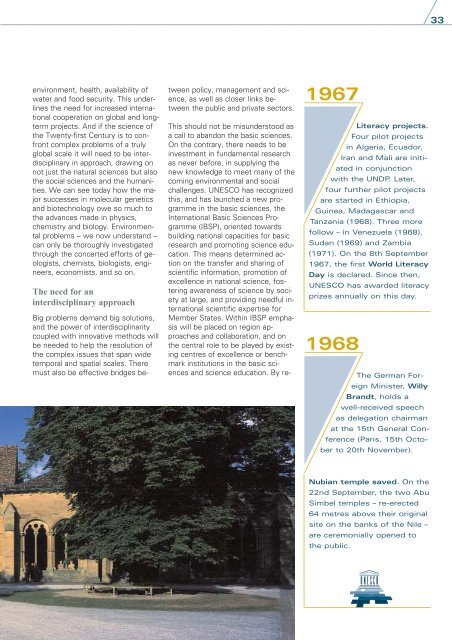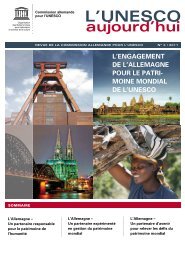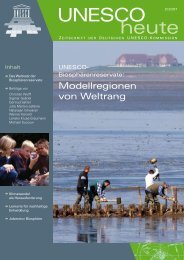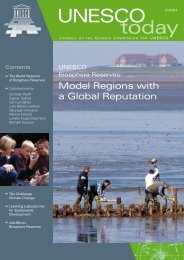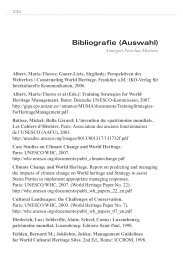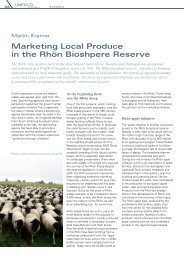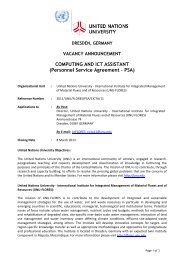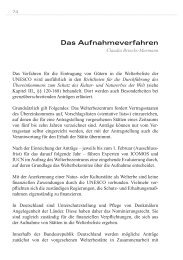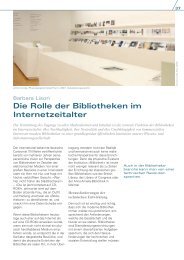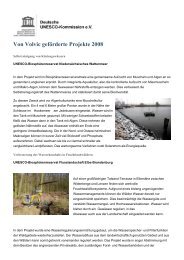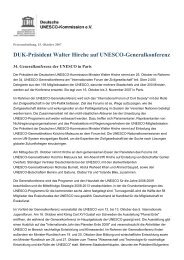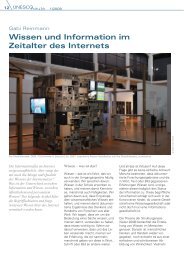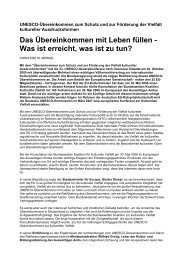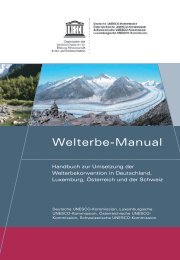Download - UNESCO Deutschland
Download - UNESCO Deutschland
Download - UNESCO Deutschland
Create successful ePaper yourself
Turn your PDF publications into a flip-book with our unique Google optimized e-Paper software.
environment, health, availability of<br />
water and food security. This underlines<br />
the need for increased international<br />
cooperation on global and longterm<br />
projects. And if the science of<br />
the Twenty-first Century is to confront<br />
complex problems of a truly<br />
global scale it will need to be interdisciplinary<br />
in approach, drawing on<br />
not just the natural sciences but also<br />
the social sciences and the humanities.<br />
We can see today how the major<br />
successes in molecular genetics<br />
and biotechnology owe so much to<br />
the advances made in physics,<br />
chemistry and biology. Environmental<br />
problems – we now understand –<br />
can only be thoroughly investigated<br />
through the concerted efforts of geologists,<br />
chemists, biologists, engineers,<br />
economists, and so on.<br />
The need for an<br />
interdisciplinary approach<br />
Big problems demand big solutions,<br />
and the power of interdisciplinarity<br />
coupled with innovative methods will<br />
be needed to help the resolution of<br />
the complex issues that span wide<br />
temporal and spatial scales. There<br />
must also be effective bridges be-<br />
tween policy, management and science,<br />
as well as closer links between<br />
the public and private sectors.<br />
This should not be misunderstood as<br />
a call to abandon the basic sciences.<br />
On the contrary, there needs to be<br />
investment in fundamental research<br />
as never before, in supplying the<br />
new knowledge to meet many of the<br />
coming environmental and social<br />
challenges. <strong>UNESCO</strong> has recognized<br />
this, and has launched a new programme<br />
in the basic sciences, the<br />
International Basic Sciences Programme<br />
(IBSP), oriented towards<br />
building national capacities for basic<br />
research and promoting science education.<br />
This means determined action<br />
on the transfer and sharing of<br />
scientific information, promotion of<br />
excellence in national science, fostering<br />
awareness of science by society<br />
at large, and providing needful international<br />
scientific expertise for<br />
Member States. Within IBSP emphasis<br />
will be placed on region approaches<br />
and collaboration, and on<br />
the central role to be played by existing<br />
centres of excellence or benchmark<br />
institutions in the basic sciences<br />
and science education. By re-<br />
1967<br />
Literacy projects.<br />
Four pilot projects<br />
in Algeria, Ecuador,<br />
Iran and Mali are initiated<br />
in conjunction<br />
with the UNDP. Later,<br />
four further pilot projects<br />
are started in Ethiopia,<br />
Guinea, Madagascar and<br />
Tanzania (1968). Three more<br />
follow – in Venezuela (1968),<br />
Sudan (1969) and Zambia<br />
(1971). On the 8th September<br />
1967, the first World Literacy<br />
Day is declared. Since then,<br />
<strong>UNESCO</strong> has awarded literacy<br />
prizes annually on this day.<br />
1968<br />
The German Foreign<br />
Minister, Willy<br />
Brandt, holds a<br />
well-received speech<br />
as delegation chairman<br />
at the 15th General Conference<br />
(Paris, 15th October<br />
to 20th November).<br />
Nubian temple saved. On the<br />
22nd September, the two Abu<br />
Simbel temples – re-erected<br />
64 metres above their original<br />
site on the banks of the Nile –<br />
are ceremonially opened to<br />
the public.<br />
33


